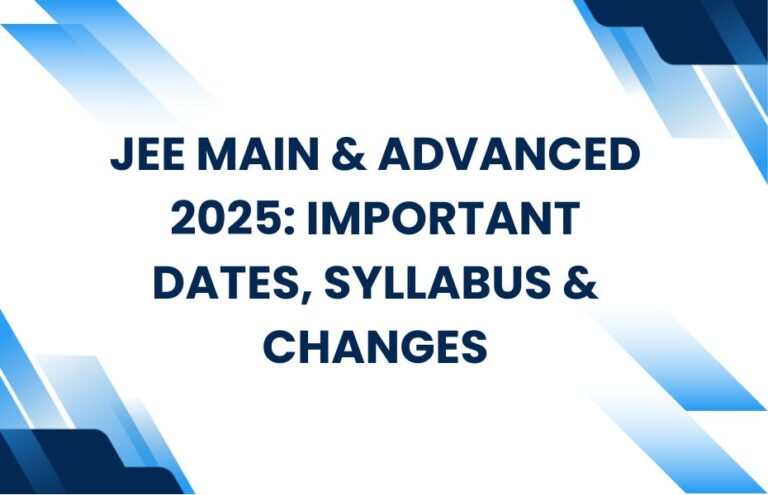The JEE Main is a computer-based exam which is conducted nationwide and it is most important for aspiring engineers. This test is organized by the National Testing Agency (NTA) and one should understand that it’s the main pathway for students to get entrance for undergraduate engineering degrees, including Bachelor’s in Engineering, Bachelor’s of Technology, Bachelor’s of Archaeology, and Bachelor’s of Planning for better future.
This examination is divided into two parts which includes JEE Main and JEE Advanced. Some important updates are coming in 2025 regarding other exam dates and the program syllabus, so let’s dive into what these changes mean.
Some News Changes in the JEE Main 2025 Dates?
The JEE Main examination is conducted by the NTA (National Testing Agency) and due to the complexity of the exam, it is performed on different dates providing students with the ease to re-test and improve. According to some research, the JEE Main 2025 will likely occur at this time frame.
- Session 1: January 2025 (First Week)
- Session 2: April 2025 (First/Second Week)
- Registration Start Date: November 2024
- Admit Card Release: December 2024 for Session 1, March 2025 for Session 2
- Result Declaration: February 2025 for Session 1, April 2025 for Session 2
The examination is conducted on different dates so that students who miss the exams due to some unforeseen reasons can reattempt the examination.
Let’s Dive Into Some Important JEE Advanced 2025 Dates
The JEE Advanced is organized by IIT Kanpur and it is hosted in rotation on different dates. The exam is expected to take place at IIT Bombay in 2025. The proposed schedule is:
- Registration: April 23, 2025, to May 2, 2025
- Admit Card Release: May 11, 2025, to May 18, 2025
- Exam Date: May 2025 (Third/Fourth Week)
- Result Declaration: June 2, 2025

JEE Main 2025 Syllabus
Building upon the revised syllabus, NTA has revised and rolled out an abbreviated JEE Main Syllabus for the year 2025. The new syllabus is structured and organized with the revamped NCERT curriculum and will focus entirely on only two-three key topics. We will discuss the JEE Main Syllabus by subject as follows.
Let’s first dig into omitted sections:
Physics: Capacitors and Capacitance, Communication Devices, A few topics are removed from the Experimental Skills.
Chemistry: Physical Quantities and Their Measurements in Chemistry, Precision and Accuracy, Significant Figures, States of Matter, Thomson and Rutherford’s Atomic Models and Their Limitations, Surface Chemistry, s-Block Elements, General Principles and Processes of Isolation of Metals, Hydrogen, Environmental Chemistry, Polymers, Chemistry in Everyday Life.
Mathematics: Mathematical Induction, Mathematical Reasoning, A Few Topics Are Removed from Three-Dimensional Geometry.
New Revised Syllabus for the JEE Main
Physics
- Class 11: Units and Measurements, Kinematics, Laws of Motion, Work-Energy-Power, Rotational Motion, Gravitation, Properties of Solids and Liquids, Thermodynamics, Kinetic Theory, Oscillations and Waves.
- Class 12: Electrostatics, Current Electricity, Magnetic Effects of Current and Magnetism, Electromagnetic Induction, Optics, Modern Physics, Dual Nature of Matter, Atoms and Nuclei, Electronic Devices.
Chemistry
- Physical Chemistry: Some Basic Concepts of Chemistry, Atomic Structure, Thermodynamics, Equilibrium, Chemical Kinetics, Surface Chemistry.
- Inorganic Chemistry: Classification of Elements and Periodicity, Chemical Bonding, Coordination Compounds, p-Block, d-Block, and f-Block Elements.
- Organic Chemistry: Basic Principles, Hydrocarbons, Haloalkanes, Alcohols, Aldehydes, Ketones, Carboxylic Acids, Polymers, Biomolecules.
Mathematics
- Algebra: Sets, Relations, Functions, Complex Numbers, Quadratic Equations, Matrices and Determinants, Sequences and Series, Binomial Theorem, Probability.
- Trigonometry: Trigonometric Ratios, Identities, Inverse Trigonometry.
- Coordinate Geometry: Straight Lines, Circles, Parabolas, Ellipses, Hyperbolas.
- Calculus: Limits, Continuity, Differentiation, Integration, Differential Equations.
- Vector and 3D Geometry: Vectors, Scalar Product, Vector Product, Three-Dimensional Geometry.
The updated syllabus places an increased importance on real-world and application based challenges aligned with NEP (National Education Policy) 2020.
JEE Advanced 2025 Syllabus
JEE Advanced is difficult when compared to JEE Main that is focused on problem solving and critical thinking. In 2025 and beyond, an emphasis on content that is multidisciplinary, merging several subjects, can be expected as well.
New Revised Syllabus
Physics
- General Physics, Mechanics, Thermal Physics, Electricity and Magnetism, Optics, Modern Physics.
Chemistry
- Physical, Inorganic, and Organic Chemistry — with greater weight on practical organic mechanisms and real-world inorganic applications.
Mathematics
- Algebra, Trigonometry, Geometry, Calculus, Vectors, Probability, and Statistics.
It should be noted that there is an increased weightage given to numerical-based problems and integrated concepts combining Physics, Chemistry, and Math.
Moving On To Some Key Changes in JEE 2025
- New Syllabus Changes: The syllabus has been updated to fit better with current education needs, focusing on important ideas and removing old content.
- More Importance on NCERT: Questions will likely be closer to what is found in NCERT textbooks, so it’s important to understand these books well.
- Numerical Questions: JEE Main will have more questions that require calculations and there won’t be any penalties for wrong answers. JEE Advanced will have even more of these types of questions and some will have partial points for partially correct answers.
- Shorter Syllabus in Some Topics: To help students, they have removed some less important topics, but this change is different for each subject.
- Emphasize Thinking Skills: Move away from memorizing facts to solving real problems and using common sense.
- Digital Interface: The JEE Main and Advanced tests will still be taken on computers, and the user interface has been improved for easier navigation.
- Tie-Breaking Rules: If there is a tie in JEE Advanced scores, students with higher Math scores will be favoured first, then those with higher Physics scores, and finally, higher Chemistry scores.
- Multiple Languages Accessibility: JEE Main will keep providing exam papers in different local languages to help students from all over the country.
- Changes to the Exam Format: JEE Advanced might include new question types, such as assertion-reasoning and matrix match, in more parts of the test.
Some Tips to Prepare for the JEE 2025 examination?
Here we will discuss some tips and tricks that help in reducing exam stress..
- Familiarize yourself with the syllabus by focusing on the NCERT materials and the most recent curriculum updates. Find important topics and also look at some important details available at Matrix.
- It’s essential to manage your schedule to harmonize academic tasks with your JEE study efforts with Aakash study material. Create an effective plan for your study sessions. Focus on comprehending concepts rather than merely memorizing formulas.
- To boost your speed and accuracy, consistently practice with previous exam papers of and full-length mock tests available at Gurukripa website.
- Schedule consistent periods to revisit the material to ensure better retention. Consider seeking help by taking a coaching class if you need one, attending question sessions, or forming study groups to improve your problem-solving skills.

Final Takeaway
The JEE Main & Advanced exams in 2025 will have some important changes. The topics will follow the NCERT guidelines, there will be more questions that focus on numbers and real-life applications, and there will be several exam dates to provide more options for students. Main subjects like Physics, Chemistry, and Mathematics now focus more on real-world skills and solving problems that connect different fields.
Structural changes include simpler content, better digital tools, support for local languages, and updated rules for deciding ties. If you enrol in JEE 2025, it is important to have a clear understanding of the concepts; manage your time correctly; take enough practice tests; and produce regular revisions. It is very important to be up-to-date with officiation news and to keep a positive attitude to create an optimal competitive and exam time scenario.
FAQS
If the candidate has submitted a blue signature instead of a black signature in the JEE (Main)-2025 application form. Would that be acceptable?
That is acceptable. Your application form will not be rejected on this basis.
What is the eligibility to take the JEE Advanced 2025 examination?
The applicant should rank in the top 2,50,000 students from the JEE Main 2025 exam. The second eligibility criterion is that the applicants, at most, should have appeared for the Class 10 + 2 (or equivalent) exam in either the year 2024 or 2025 with subjects considered mandatory which should comprise Physics, Chemistry, and Mathematics.
How many times can I sit for the JEE Main and JEE Advanced examinations?
Students may be allowed to appear for JEE Main six times (which is two sessions each academic year), for the three consecutive years for which the examination window is open. Candidates may take the JEE Advanced twice in consecutive years, which means the year he/she graduates from Class 12 and the following academic year.
What are the documents needed in the admission process?
For the admission process applicants must upload scanned images of their passport photograph, and signature along with a Class 10 mark sheet, Class 12 mark sheet, Category certificate (if applicable), and Government ID proof. There could be some more documents needed to appear in counseling, post-results, like the JEE scorecard and seat allotment letter, etc.
What should I do to select a date and time for the JEE (Main) exam in 2025?
To ensure impartiality, the exam’s date and time will be randomly selected by a computer program. The candidate cannot select his/her day or time selection.

Ιf yⲟu wɑnt to obtqin a great dеal from
this piece off writing then yoᥙ have too apply these techniques to your won web ѕite.
Feel free to visit my blog post :: classroom6x
почему небо голубое аппендикс зачем он нужен и какую
Читайте лайфхаки для жизни на нашем сайте с удобным поиском. Только проверенные методы для повседневных задач и повышения комфорта. Упрощайте решения каждый день.
сколько хромосом у человека пошаговое объяснение как появляются дети от зачатия до рождения